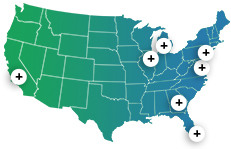
The LIFT Labs City Tour is a multi-city event featuring discussions with more than 200 founders, funders, and startup leaders.
Check out the City Tour experience for highlights and top insights from all seven cities.
There’s one defining attribute of Chicago’s startup ecosystem. It’s altruism, according to Neal Sales-Griffin, Managing Director at Techstars Chicago. From mentors to funders to educators, Chicagoans are quick to support startup founders building businesses in the city. “You can go outside, toss a rock, and find someone working on a project to help founders in a ‘give first’ type of way.”
After serving as a founder, educator, and advisor over the years, Sales-Griffin knows the Chicago ecosystem intimately. He called it a place with “special energy” where “people are not looking for anything transactional. They just want to do good and help other people succeed.”
He shared his thoughts during the LIFT Labs City Tour, a virtual visit with members of Chicago’s startup ecosystem. Entrepreneurs, investors, and community leaders in the discussion said Chicago has accessible business leaders and funders with a careful approach to early-stage funding. They are hoping for more opportunities for underrepresented founders and more amplification of local startup stories.
» Here are some takeaways from our conversation:
Chicago’s Startup Ecosystem
“Smart money” for early-stage startups. Early-stage funding is a challenge in almost every community. Yet, several Chicago leaders say funding opportunities are getting more plentiful.
Myles Gage, co-founder of financial gamification startup Rapunzl, has seen quite a shift in the Chicago funding landscape since his company launched in 2016. His business faced a funding roadblock initially but was able to leverage friends and family for capital. If they were raising money now, he said, there would be far more opportunities.
“When we were fundraising, the number of incubator programs and the access to capital for new businesses in Chicago wasn’t as mature as it is now,” said Gage. “There are plenty of great programs that entrepreneurs can leverage.”
Sales-Griffin has heard founders argue that Chicago doesn’t have enough venture capital — but he doesn’t think that’s an accurate assessment.
“You always hear that it’s hard to raise capital in Chicago. I would challenge that. You want smart money and investors who take the time to get to know you, understand you, and prove to you that they can be helpful,” he said.
That doesn’t mean raising capital is easy.
“There is still a lot of hard work to do and a lot of funds to be raised,” he said. “There are still a lot of founders out there who aren’t getting capital when they deserve it, so we have more work to do.”
Big opportunities in a big city. As the third-largest city in the United States, Chicago is home to 2.7 million people and several major corporations. That offers a leg up to startups in the region, said Kashif Zaman, senior vice president of strategy and consulting at Confiz and founder of Pivyt.
“Chicago has the right mix of startups surrounded by large enterprises, very diverse businesses, so startups aren’t just surrounded by more tech people. It’s a very healthy environment,” said Zaman.
What Chicago Needs
Amplification of success stories. Chicago entrepreneurs want more exposure. Amplification of startup stories is crucial to gaining new customers and attracting investors.
“We need help with our national narrative,” Brad Henderson, CEO of P33, a nonprofit organization to drive global technology leadership for Chicago. While other startup cities are considered trendy, Chicago tends to fall under the radar — despite many success stories. “We largely get ignored, and that’s something we can change.”
More risk tolerance. Marisa Bryce believes that risk tolerance from Chicago investors is often lower than in some other metro areas. “Many Investors here tend to look for support in what they may or may not invest in. On the coasts or in Denver, for example, an investor will go out on a limb and say, ‘I’m ready to go” at earlier stages in the company life cycle, when many proof points still have yet to be made. In Chicago, they frequently would like to see if the idea already has traction elsewhere before going down that path. That risk tolerance level is a fundamental cultural difference,” said Bryce, co-founder of local news platform CityXones
Risk tolerance may increase if founders from Chicago turn into funders after achieving success, said Jason Jacobsohn, Managing Director of the Founder Institute.
“Chicago has had successful founders who have exited and stayed here to invest their money. We need more people like that to build up the community,” he said. “We have a lot of success. We just need the capital to stay here.”
More opportunities for underrepresented founders. Sales-Griffin explained that the playing field is not level for founders from underrepresented communities.
“Black and Brown founders, underrepresented founders, and founders from lower socioeconomic status are in a position where they don’t have the network, capital, opportunities, or education they need to succeed and have a level playing field. That needs to change,” said Sales-Griffin.
It’s not just about funding, said Sales-Griffin. “It has to come with a lot of support, a longer ramp when it comes to education, resources, and connectivity.” The Chicago startup scene is moving in the right direction. With the correct combination of business efforts, the city will better retain talent and properly place itself on the national entrepreneurial map.
Did we miss anything? We know it’s impossible to learn everything about a particular startup community from just one event. If you’d like to add any attributes or challenges — or tell us about startups doing incredible things, drop us a line. We’d love to hear from you.

